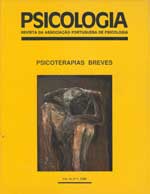Terapias breves numa perspectiva cognitivo-comportamental
DOI:
https://doi.org/10.17575/rpsicol.v6i1.784Abstract
After focusing on the historical evolution of the concept of «brief therapy» and characterizing it both in terms of content and temporal limits, the authors stress some of the methodological problems associated with its efficacy. It is also stressed that the structural features of cognitive-behavioral therapy (focus, methodologies of intervention, and temporal limits) afford classifying it as a form of brief therapy as well as differentiating it from other form of brief therapy (i.e., psychodynamic and behavioral). It is also argued, from the standpoint of epistemological cognitive therapy, that the decisions regarding durability of the therapeutic process should be a result of clients’ characteristics and goals since psychotherapy is understood as a process of personal growth toward psychological «self-management».Downloads
Download data is not yet available.
Downloads
How to Cite
Mourinho Baptista, T., & Branco Vasco, A. (1988). Terapias breves numa perspectiva cognitivo-comportamental. PSICOLOGIA, 6(1), 17–22. https://doi.org/10.17575/rpsicol.v6i1.784
Issue
Section
Thematic issue


